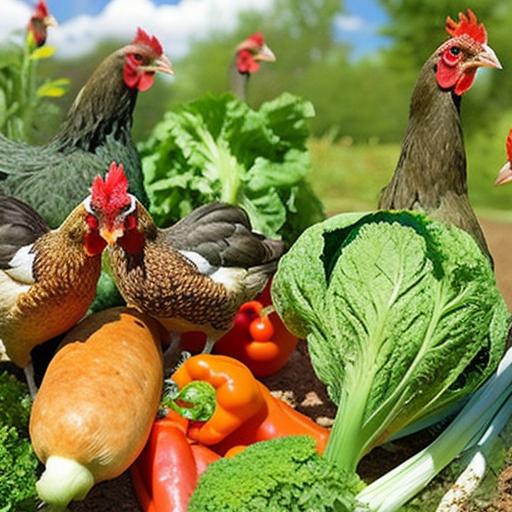Keeping chickens in your vegetable garden can be a rewarding and beneficial experience. Not only do chickens provide fresh eggs and meat, but they also offer several advantages for your garden. Chickens can help control pests, provide natural fertilizer, and even help with weed control. In this article, we will explore the benefits of having chickens in your garden, how to integrate them into your vegetable garden, choosing the right chicken breeds, building a chicken coop, feeding your chickens with garden produce, managing chicken waste, protecting your garden from chicken damage, training your chickens, harvesting eggs and meat, and troubleshooting common issues.
Key Takeaways
- Keeping chickens in your vegetable garden can provide numerous benefits, including pest control, soil fertilization, and egg and meat production.
- Integrating chickens into your garden requires careful planning and consideration of factors such as space, fencing, and predator protection.
- Choosing the right chicken breeds for your garden depends on your specific needs and preferences, such as egg-laying ability, temperament, and hardiness.
- Building a chicken coop in your garden requires attention to details such as ventilation, lighting, and nesting boxes, as well as proper sanitation and maintenance.
- Feeding your chickens with garden produce can be a great way to supplement their diet and reduce food waste, but it’s important to avoid feeding them toxic or harmful plants.
- Managing chicken waste in your garden can be done through composting, mulching, or using it as fertilizer, but it’s important to avoid overloading the soil with nitrogen and other nutrients.
- Protecting your garden from chicken damage requires measures such as fencing, netting, and plant selection, as well as training your chickens to respect boundaries and avoid digging or scratching.
- Properly training your chickens is essential for their safety, health, and productivity, and involves teaching them basic commands, handling them gently, and providing them with adequate space and resources.
- Harvesting eggs and meat from your garden chickens requires following proper hygiene and food safety practices, as well as respecting animal welfare and ethical considerations.
- Troubleshooting common issues with garden chickens involves identifying and addressing problems such as egg-laying problems, health issues, behavioral issues, and predator attacks, and seeking advice from experienced chicken keepers or veterinarians if needed.
Benefits of Keeping Chickens in Your Vegetable Garden
One of the main benefits of having chickens in your vegetable garden is pest control. Chickens are natural foragers and will eat insects, slugs, snails, and other pests that can damage your plants. They can help keep the pest population under control without the need for harmful pesticides. Additionally, chickens can help with weed control by scratching and pecking at the ground, reducing the number of weeds in your garden.
Another benefit of keeping chickens in your vegetable garden is their ability to produce natural fertilizer. Chicken manure is rich in nutrients and can be used to fertilize your plants. By allowing chickens to roam freely in your garden or using a movable chicken coop, you can ensure that their manure is evenly distributed throughout the garden. This can help improve soil fertility and promote healthy plant growth.
How to Integrate Chickens into Your Vegetable Garden
Introducing chickens to your vegetable garden requires careful planning and preparation. First, it is important to create a safe and comfortable environment for your chickens. This includes providing adequate shelter from predators and extreme weather conditions. You should also provide a secure fencing system to prevent chickens from wandering into areas where they may cause damage.
When introducing chickens to your garden, it is best to start with a small number and gradually increase the flock size. This allows the chickens to become familiar with their surroundings and reduces the risk of stress or aggression. It is also important to provide them with a balanced diet and access to fresh water at all times.
Choosing the Right Chicken Breeds for Your Garden
When choosing chicken breeds for your vegetable garden, it is important to consider their characteristics and suitability for your specific needs. Some breeds are better suited for free-ranging and foraging, while others are more docile and better suited for confinement. Additionally, some breeds are known for their ability to lay a large number of eggs, while others are prized for their meat production.
Some recommended chicken breeds for vegetable gardens include Rhode Island Reds, Sussex, Australorps, and Orpingtons. These breeds are known for their ability to adapt to different environments, their docile nature, and their good egg-laying capabilities. It is important to research different breeds and choose the ones that best fit your garden’s needs.
Building a Chicken Coop in Your Vegetable Garden
Building a chicken coop in your vegetable garden is essential for providing your chickens with a safe and comfortable living space. The coop should be well-ventilated to prevent the buildup of moisture and odors. It should also be insulated to protect the chickens from extreme temperatures.
When building a chicken coop, it is important to consider the size of your flock and provide enough space for each chicken. The coop should have nesting boxes for egg-laying, perches for roosting, and a secure door to keep predators out. It is also important to provide easy access to food and water.
Feeding Your Chickens with Garden Produce

Feeding your chickens with garden produce can be a great way to supplement their diet and reduce feed costs. Chickens can eat a variety of fruits and vegetables, including leafy greens, tomatoes, cucumbers, zucchini, and berries. However, it is important to avoid feeding them toxic plants such as nightshade plants, onions, and rhubarb.
Feeding your chickens with garden produce not only provides them with a nutritious diet but also helps reduce food waste. You can give them leftover or damaged fruits and vegetables that would otherwise go to waste. Just make sure to wash the produce thoroughly before feeding it to your chickens.
Managing Chicken Waste in Your Vegetable Garden
Chicken manure is a valuable source of fertilizer for your vegetable garden. It is rich in nitrogen, phosphorus, and potassium, which are essential nutrients for plant growth. However, it is important to manage chicken waste properly to prevent the buildup of harmful bacteria and odors.
One way to manage chicken waste is by using a deep litter system in the chicken coop. This involves adding a layer of bedding material, such as straw or wood shavings, on the coop floor. As the chickens scratch and peck at the bedding, their droppings mix with the bedding material, creating a composting effect. This helps break down the waste and reduces odors.
Protecting Your Garden from Chicken Damage
While chickens can provide several benefits for your vegetable garden, they can also cause damage if not properly managed. Chickens have a natural instinct to scratch and peck at the ground, which can uproot plants and damage delicate seedlings. They may also eat young shoots or fruits if given the opportunity.
To protect your garden from chicken damage, it is important to provide them with designated areas for foraging and scratching. You can use movable fencing or chicken tractors to confine them to specific areas while still allowing them access to fresh grass and insects. It is also important to monitor their behavior and intervene if they start causing damage.
The Importance of Properly Training Your Chickens
Properly training your chickens is essential for preventing bad behavior and ensuring their safety. Chickens can be trained to come when called, stay within designated areas, and even perform simple tricks. Training can be done using positive reinforcement techniques, such as rewards and treats.
Training your chickens not only helps prevent damage to your garden but also strengthens the bond between you and your flock. It can also make it easier to handle and care for your chickens, reducing stress for both you and the birds.
Harvesting Eggs and Meat from Your Garden Chickens
One of the main benefits of keeping chickens in your vegetable garden is the ability to harvest fresh eggs and meat. Chickens that are well-cared for and provided with a balanced diet can produce high-quality eggs with vibrant yolks. Harvesting eggs from your own chickens not only ensures their freshness but also allows you to control the quality of the eggs.
If you choose to raise chickens for meat, it is important to follow proper processing techniques to ensure food safety. This includes slaughtering the chickens humanely and following proper sanitation practices during processing.
Troubleshooting Common Issues with Garden Chickens
While keeping chickens in your vegetable garden can be a rewarding experience, it is not without its challenges. Common issues that garden chicken owners may face include predator attacks, disease outbreaks, egg-eating, and aggressive behavior.
To troubleshoot these issues, it is important to take preventive measures such as providing secure fencing, practicing good biosecurity measures, and monitoring the health of your flock. It is also important to address any behavioral issues promptly by identifying the cause and implementing appropriate training techniques.
Keeping chickens in your vegetable garden can provide numerous benefits, including pest control, natural fertilizer production, and fresh eggs and meat. By integrating chickens into your garden, you can create a symbiotic relationship where both plants and animals thrive. However, it is important to carefully plan and manage your flock to ensure their safety and prevent damage to your garden. With proper care and attention, chickens can be a valuable addition to your vegetable garden. Consider adding chickens to your garden and enjoy the many benefits they bring.
If you’re considering keeping chickens in your vegetable garden, you may also be interested in learning about the importance of a well-designed chicken coop. A properly constructed coop not only provides a safe and comfortable space for your feathered friends but also helps to maintain a clean and healthy environment. In this informative article on Poultry Wizard, you can discover the top 10 features to consider when building or buying a chicken coop. From ventilation and insulation to predator-proofing and easy cleaning, these essential elements will ensure that your chickens are happy and your garden remains productive. To delve deeper into this topic, check out the article here.
FAQs
What are the benefits of keeping chickens in a vegetable garden?
Keeping chickens in a vegetable garden can provide several benefits such as natural pest control, fertilization of the soil, and a source of fresh eggs.
What are the potential drawbacks of keeping chickens in a vegetable garden?
The potential drawbacks of keeping chickens in a vegetable garden include damage to plants, soil compaction, and the risk of disease transmission to both plants and humans.
What should be considered before keeping chickens in a vegetable garden?
Before keeping chickens in a vegetable garden, it is important to consider local zoning laws, the amount of space available, the type of chickens to be kept, and the necessary equipment and supplies.
What type of chickens are best suited for a vegetable garden?
Chickens that are best suited for a vegetable garden are those that are docile, good foragers, and do not fly well. Breeds such as Rhode Island Reds, Plymouth Rocks, and Sussex are good choices.
How can chickens be kept from damaging vegetable plants?
Chickens can be kept from damaging vegetable plants by providing them with a designated area to roam, using fencing or netting to protect plants, and providing them with alternative sources of food and entertainment.
What are some tips for keeping chickens and vegetable gardens healthy?
Some tips for keeping chickens and vegetable gardens healthy include practicing good hygiene, providing clean water and food, regularly cleaning the coop and garden area, and monitoring for signs of disease or pests.
Meet Walter, the feathered-friend fanatic of Florida! Nestled in the sunshine state, Walter struts through life with his feathered companions, clucking his way to happiness. With a coop that’s fancier than a five-star hotel, he’s the Don Juan of the chicken world. When he’s not teaching his hens to do the cha-cha, you’ll find him in a heated debate with his prized rooster, Sir Clucks-a-Lot. Walter’s poultry passion is no yolk; he’s the sunny-side-up guy you never knew you needed in your flock of friends!







